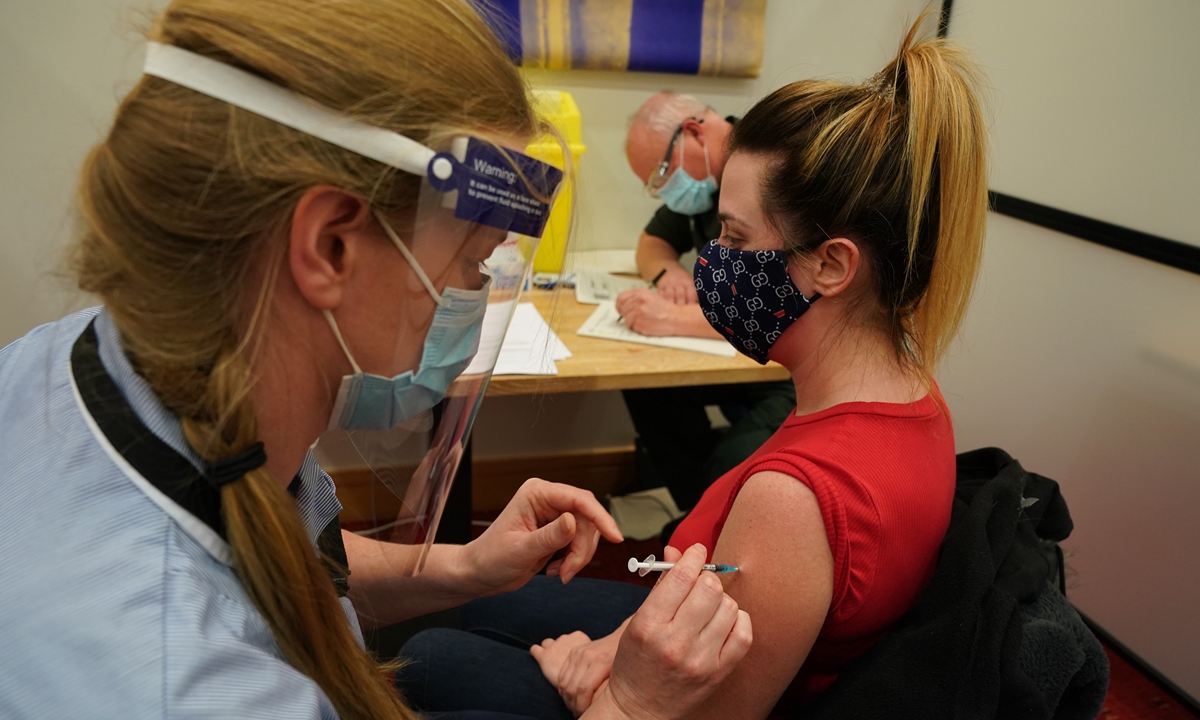IMF urges decisive gov't actions to ensure swift, extensive vaccine rollouts

A health worker receives her COVID-19 vaccine along with other social care workers at the International Centre for Life in Newcastle upon Tyne, northeast England, on Saturday. Photo: AFP
Decisive government actions are necessary to ensure swift and extensive vaccine rollout, protect the most vulnerable households and otherwise viable firms, and foster a durable and inclusive recovery, the International Monetary Fund (IMF) said Thursday.
"The COVID-19 pandemic is accelerating in many countries and uncertainty is unusually high," Vitor Gaspar, director of the IMF's Fiscal Affairs Department, and his three colleagues wrote in a blog, as the IMF released its Fiscal Monitor update.
"Global cooperation on producing and widely distributing treatments and vaccines to all countries at low cost is crucial," Gaspar said. "The sooner the global pandemic ends, the quicker economies can return to normal and people will need less government support."
According to the Fiscal Monitor update, global fiscal support reached nearly 14 trillion U.S. dollars as of end-December 2020, up by about 2.2 trillion dollars since October 2020.
"COVID-19 was an enormous disturbance to all countries around the world. Tax revenues have shrunk quite substantially," Gaspar told Xinhua in a video interview, calling such fast and strong fiscal actions "absolutely necessary" to help contain the pandemic and to avoid a financial crisis.
Together with economic contraction that has resulted in lower revenues, such support has led to a rise in public debt and deficits, according to the IMF report. Average public debt worldwide approached 98 percent of gross domestic product (GDP) at the end of 2020, compared with 84 percent projected pre-pandemic for the same date.
When asked whether policymakers should be concerned about the ballooning public debt, the IMF official told Xinhua that one has always to be concerned about proper management of public finance risks, and to bear in mind public debt sustainability, but at this point in time, "the very first priority is to defeat the pandemic."
"Most countries will need to do more with less, considering the increasingly tight budget constraints," Gaspar said. "This means focusing on the hardest-hit and most vulnerable, including the poor, women, and informal workers, and firms that are likely to remain viable after the crisis or are systemically important to the economy."
He urged policymakers to strike a "balance" between providing more short-term support to ensure a solid recovery and keeping debt at a manageable level over the longer term.
"The priority is to provide relief support, to provide lifelines, to make sure that support is there when it is needed," the IMF official told Xinhua. "But in order for that work well, it's very important that people have trust that the situation over the long run is under control."
"One should always think about economic activity and employment in the short run from the viewpoint of long run development, having a long run view helps a lot," Gaspar added.
The report also noted that in low-income countries, the fiscal policy response has been more "limited," owing to financing constraints and less developed welfare programs, adding that the pandemic thus risks leaving "a lasting impact" in these countries.
"Even before COVID-19, the poorest countries in the world, low-income developing countries were facing binding financing constraints in their challenges to reach the sustainable development goals by 2030," Gaspar said, noting that the financing constraints became even more "dramatic" with COVID-19.
The IMF has rapidly deployed financing facilities, which have thus far supported more than 80 countries, of which 50 are low-income countries, according to the IMF official.
Meanwhile, he noted, the Group of Twenty (G20) has been very active with the Debt Service Suspension Initiative (DSSI) and more recently, with the common framework for debt treatments beyond DSSI.
Low-income countries will need additional assistance, including through grants, concessional financing, an extension of the G20 DSSI, or, in some cases, debt restructuring, Gaspar said.
"Clearly there is a general recognition that poor countries do need support," he said, noting that the vaccination process is lagging behind for low income countries at this point in time.
"But of course COVID-19 will not be under control anywhere before it is under control everywhere. And investing in the vaccination process is probably the most profitable investment that one can carry out now in the world economy," Gaspar told Xinhua.
The IMF official noted that fiscal policy should enable a green, digital, and inclusive transformation of the economy in the post-COVID-19 environment, with the priorities including investing in health systems, education, and infrastructure, helping people go back to work and move between jobs, as well as strengthening social protection systems.
In addition, policymakers should rethink tax systems to promote greater fairness and provide incentives to protect the environment, and cut wasteful spending, strengthen the transparency of spending initiatives, and improve governance practices to reap the full benefits of fiscal support, he continued.
"Governments need to win the vaccination race, respond flexibly to the changing economic conditions, and set the stage for a greener, fairer, and more durable recovery," Gaspar said.
